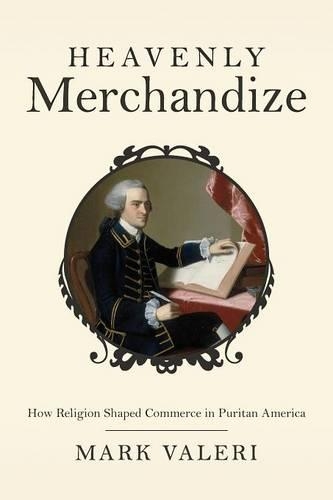
Heavenly Merchandize: How Religion Shaped Commerce in Puritan America
(Paperback)
Available Formats
Publishing Details
Heavenly Merchandize: How Religion Shaped Commerce in Puritan America
By (Author) Mark Valeri
Princeton University Press
Princeton University Press
18th March 2014
United States
Classifications
Tertiary Education
Non Fiction
261.85097409032
Short-listed for American Academy of Religion Award for Excellence in the Study of Religion in Historical Studies 2011
Physical Properties
Paperback
360
Width 152mm, Height 235mm
539g
Description
Heavenly Merchandize offers a critical reexamination of religion's role in the creation of a market economy in early America. Focusing on the economic culture of New England, it views commerce through the eyes of four generations of Boston merchants, drawing upon their personal letters, diaries, business records, and sermon notes to reveal how merc
Reviews
Winner of the 2011 Philip Schaff Prize, American Society of Church History Shortlisted for the 2011 American Academy of Religion Award for Excellence in the Historical Study of Religion One of Choice's Outstanding Academic Titles for 2010 "Valeri's reading of theological sources is so satisfying because he is a subtle, careful reader; he resists the temptation to smooth away contradictions, or to oversimplify; indeed, he seems allergic to polemic it is thus not surprising when, at the end of the book--just when the author might be expected to tip his hand about what all this market accommodation means--Valeri is maddeningly even-handed."--Lauren F. Winner, Books & Culture "I found this book to be an outstanding contribution to our understanding of the working out of the Protestant ethic in colonial New England. Therefore, it is a major contribution to our understanding of American economic morality."--Donald E. Frey, EH.Net "Students of early New England will find this indispensable; it should also appeal to anyone interested in the relationship between religion and the larger culture."--Choice "[T]he effectiveness with which Valeri utilizes the small-scale cultural world of Puritan Massachusetts in the colonial era in order to examine developments that have wider ramifications, indicates that, as with Perry Miller and so many others, that time and place is still a fruitful laboratory for thick analysis of religiocultural change."--Dewey D. Wallace, Jr., Interpretation "Valeri's well-written case studies bring many rewards to the reader. They forcefully demonstrate that no one can understand the changing culture of early America without paying attention to religion."--R. Laurence Moore, Journal of Church History "The book is noteworthy as much for its method as for its conclusions. Valeri's inferences rise convincingly from his methodology, analysis, and rhetoric... [H]andled artfully in an elegant narrative."--Barry Levy, American Historical Review "This book will certainly change the way both Puritan theology and economics are viewed and is highly recommended."--Suzanne Geissler, Anglican and Episcopal History "An important study... [T]his stellar work breaks important new ground on the complex drama of economics and religion in early modern America."--Robert E. Brown, Religious Studies Review
Author Bio
Mark Valeri is the Ernest Trice Thompson Professor of Church History at the Union Theological Seminary and Presbyterian School of Christian Education in Virginia. His books include Law and Providence in Joseph Bellamy's New England: The Origins of the New Divinity in Revolutionary America and The Works of Jonathan Edwards, Volume 17: Sermons and Discourses, 1730-1733.
